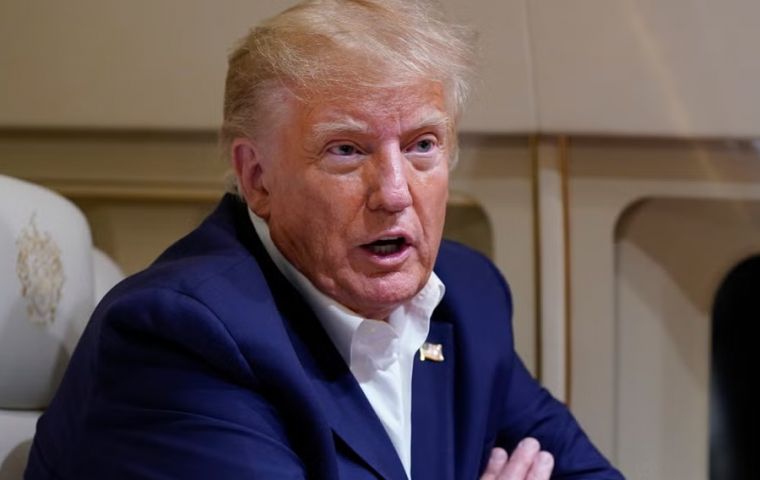MercoPress. South Atlantic News Agency
Trump orders all files regarding JFK, RFK, and MLK murders disclosed
 Trump's executive order rendering children of illegal aliens ineligible for US citizenship is “blatantly unconstitutional,” Seattle Federal Judge John Coughenour said
Trump's executive order rendering children of illegal aliens ineligible for US citizenship is “blatantly unconstitutional,” Seattle Federal Judge John Coughenour said US President Donald Trump's executive order issuing spree during his first week in office included the declassification in the interest of transparency of all documents pertaining to the murders of then-President John F. Kennedy (JFK) in 1962, as well as those of Senator Robert F. Kennedy, Sr. (RFK) and civil rights leader and Martin Luther King Jr. (MLK) in 1968.
As per Trump's instructions, the Director of National Intelligence and the Attorney General have 15 days to present a plan for the “full and complete” release of records related to JFK's assassination and 45 days for the cases of RFK and MLK. Some records have already been released over time under different legislation or executive actions but public interest has never found any conclusive answer to these high-profile assassinations.
The Kennedy brothers were known Democrats while MLK did not formally endorse any political party. However, he did express gratitude for JFK's concern about his imprisonment in 1960 and urged his followers to vote against Republican candidate Barry Goldwater in 1964 due to the latter's opposition to the Civil Rights Act. Goldwater won the Republican nomination but was defeated by incumbent President Lyndon B. Johnson in a landslide.
Ironically, RFK's son, known as RFK Jr., dropped his independent presidential bid in 2024 and joined Trump's efforts on the Republican side.
Trump also signed the proper documents Friday lifting all State-sponsored security details for former allies and longtime rivals, most notably Doctor Anthony Fauci, who stood behind mandatory mask-wearing and forced vaccination against Covid-19. Trump also reinstated with full pay all military personnel discharged for refusing to comply with those unproven medical treatments and lockdowns.
Fauci gained notoriety as director of the National Institute of Allergy and Infectious Diseases already during Trump’s first term. He was later promoted to chief medical adviser under President Joseph Biden.
Trump even called Fauci a “disaster” and repeatedly said he would fire him if reelected in 2020. By 2025, Fauci had already retired. Upon returning to the White House, Trump said Fauci made a lot of money working for the Government and could easily afford his security staff. According to local media, Fauci and his family have faced death threats for his involvement in the government’s pandemic response. He would be retaining private security services, it was also reported.
One of Trump's first measures was to tackle illegal immigration and ban birthright citizenship to discourage pregnant women from entering the country anyhow to then claim residence eligibility as the next of kin of a US national under the 14th Amendment. But Seattle Federal Judge John Coughenour Thursday signed a temporary restraining order deeming Trump's move as “blatantly unconstitutional.”
Trump's executive order contends that a child born in the United States to an undocumented mother cannot receive citizenship unless his or her father is a citizen or green card holder. The President's initiative is expected to go through further legal challenges and appeals. The magistrate also said he would consider a long-term injunction over the coming weeks as he weighs the case filed by the attorneys general of Arizona, Oregon, Washington, and Illinois. “Absent a temporary restraining order, children born in the Plaintiff States will soon be rendered undocumented, subject to removal or detention, and many stateless,” the plaintiffs claimed.
“Obviously, we will appeal it,” Trump said in the Oval Office. “There's no surprises with that judge,” he added.
“We look forward to presenting a full merits argument to the Court and to the American people, who are desperate to see our Nation's laws enforced,” the Justice Department also mentioned in a statement.
Following the Civil War, jus soli (citizenship rights stemming from the birthplace regardless of the child's parent's lineage) was provided for in the 14th Constitutional Amendment, repudiating the Supreme Court's ruling in Dred Scott v Sanford that African Americans were ineligible for citizenship. “Nothing in the Constitution grants the President, federal agencies, or anyone else authority to impose conditions on the grant of citizenship to individuals born in the United States,” the plaintiffs argued. Legal scholars have expressed skepticism about the legality of Trump's executive order.




Top Comments
Disclaimer & comment rules-

Read all commentsIt would be much more interesting to see the “Epstein Files”, if I am entirely honest. I wonder why he hasn't decided to release those?
Jan 28th, 2025 - 08:02 am +1Commenting for this story is now closed.
If you have a Facebook account, become a fan and comment on our Facebook Page!